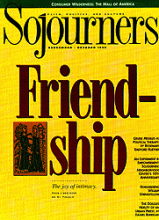It used to be that Sojourners Community rented a huge, four-story house on Euclid Street NW. Seventeen of us once lived there. One of our favorite days of the year was the Fourth of July.
Our neighbors knew we weren't exactly the flag-waving type, but they also knew that Independence Day brought us all out on the roof. Some of them joined us. And there, just after dusk, no matter which direction you turned, you saw fireworks.
For starters, there was the big show down on Washington, D.C.'s mall. If you rotated to the southwest, you could catch the explosive display from the Virginia suburbs. Turn north and you caught the rockets' red (and blue and green and white) glare from Maryland. We oohed and ahhed at fireworks in the round. The children were particularly appreciative.
I savored that memory in a later year when the Fourth rolled around. I was enjoying small-town fireworks on my own, sitting on a grassy bank just a few yards from the point of their projection.
From up close, there was the anticipation of watching a flare shoot into the air and then waiting to see what colors would explode across the black sky. Some flashed and sparkled; some showered light in crisscross patterns; some swiveled brightly on their whistling paths toward the stars.
The effect was loud from that distance. Some of the fireworks crackled with several explosions at once. Children covered their ears. The colors were still red, blue, green, and white (I suppose that orange and purple have yet to be perfected). It was all over in a matter of minutes.
PEOPLE QUICKLY packed up their quilts and folding chairs, scooped up the children, and headed for their cars. It was suddenly very quiet, and a bit lonely. And in that first moment of stillness, something even more spectacular climbed above the trees into the sky.
Read the Full Article

